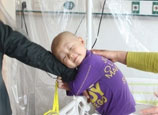
TraditionalL Chinese herbs are being contaminated with a toxic cocktail of pesticides that poses a threat to health and the environment, campaign group Greenpeace said yesterday.
Its tests revealed that up to 48 of 65 samples purchased from nine pharmacies tested positive for pesticide residue, including banned substances. Some residue levels were hundreds of times higher than EU food safety standards, Greenpeace East Asia reported.
The group found 51 different types of pesticide residue and 26 of the samples contained pesticides that are banned in China.
The samples included some from renowned producers such as Tongrentang, a Beijing-based pharmaceutical company founded in 1669 and the largest producer of traditional Chinese medicine, and the Yunnan Baiyao Group, famous for a medicine used to treat bleeding injuries.
"Chinese herbs are trusted and used as food ingredients for healing purposes by millions of people around the world. They are an iconic part of our heritage we must preserve. Chinese herbs should heal, not harm people and must be pesticide free," said Wang Jing, an ecological farming campaigner with Greenpeace East Asia.
Highly hazardous
"These test results expose the cracks in the current industrial agriculture system that is heavily reliant on toxic chemicals at the expense of human and environmental health," Wang said.
The tests found that 32 samples contained traces of three or more different pesticides. Dried sanqi flowers contained up to 39 kinds of pesticide, chrysanthemum up to 35 and honeysuckle flowers up to 21.
Ten pesticides classified by the World Health Organization as extremely or highly hazardous and six banned for use on Chinese herbs were found.
Pesticide residue in the sanqi flowers was 500 times over Europe's safe limit and that in honeysuckle flowers 100 times the limit.
Long-term exposure to pesticide residue in food may cause toxic chemicals to accumulate in the body. Chronic pesticide poisoning may lead to learning difficulties, hormone disruption and reproductive abnormalities.
Even leading traditional Chinese medicine makers don't set standards or carry out tests for pesticide residue, Greenpeace cliamed.
The "ugly side" of chemical-intensive agriculture is everywhere but in China in particular, said Kumi Naido, executive director of Greenpeace International.
Many farmers bought pesticides on the recommendation of local retailers rather than following professional guidelines from authorities or pesticide makers, Greenpeace said in its report.
Pesticide abuse in herb growing is only part of a much bigger problem, it said, which was the general failure of chemical-intensive agriculture to feed people safely while preventing environmental degradation. Greenpeace said the use of pesticides in Chinese agriculture was rising at about 3 percent a year.
Currently, the country uses almost 2 million tons of pesticide a year in agriculture. About 70 percent of those pesticides end up as hazardous pollution in water, soil and air.
Greenpeace is calling on companies to publicly disclose all pesticides used in the production of Chinese herbs and to provide a timeline aimed at reducing their use. It is also calling on China to impose stricter controls on pesticide use and allocate funds to support ecological farming.
None of the companies named in the Greenpeace report has commented so far.
















 Chengguan burdened by reputation
Chengguan burdened by reputation
&--frequently criticized for the excessive,sometimes brutal force on their duties


![]()
